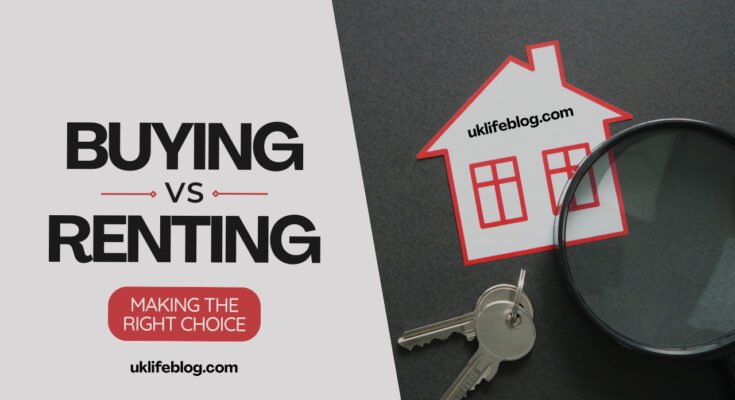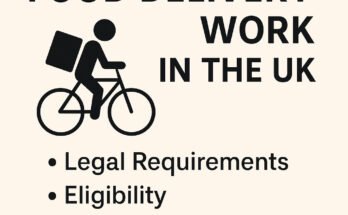The debate over renting vs. buying in the UK is one of the most significant financial decisions you’ll ever face. Whether you’re a first-time buyer or someone considering a lifestyle change, understanding the advantages and disadvantages of both options is crucial. Each choice has financial, emotional, and practical implications. In this comprehensive guide, we’ll break down the major pros and cons of renting and buying in the UK to help you make the most informed decision possible.
Renting vs. Buying in the UK: Overview
Before diving into the specifics, let’s define what renting and buying entail:
- Renting involves paying a landlord to live in a property. You’re not responsible for maintenance, but you don’t own the property.
- Buying means purchasing a home, either outright or through a mortgage. You gain full control but also shoulder full responsibility.
Now, let’s explore the pros and cons of each option.
Pros of Renting in the UK
1. Flexibility
Renting offers the flexibility to move quickly for job opportunities, lifestyle changes, or family reasons. There’s no long-term commitment, which is ideal for people who don’t want to be tied down.
2. Lower Upfront Costs
When renting, you typically need only a deposit (usually 4-6 weeks’ rent) and the first month’s rent. In contrast, buying a home requires a deposit of at least 5–10% of the property’s value, legal fees, stamp duty, and more.
3. No Maintenance Worries
Landlords are responsible for most maintenance and repair costs. This can be a huge financial relief compared to homeowners who must handle all property upkeep.
4. Access to Prime Locations
Renting can make living in expensive city centres more affordable. Buying in places like London is often out of reach for many people.
5. Predictable Expenses
Rent is usually fixed for the duration of your contract. While rents can increase, they’re often more predictable than fluctuating interest rates.
Cons of Renting in the UK
1. No Ownership or Equity
You don’t build equity or gain financial returns from your rental payments. It’s often referred to as “paying someone else’s mortgage.”
2. Limited Control
You may not be able to personalise your living space. Any significant changes require landlord approval.
3. Risk of Eviction
Your landlord can choose not to renew your lease or may decide to sell the property, which forces you to move.
4. Rent Increases
Rental prices can increase annually, especially in high-demand areas. This can make long-term budgeting more challenging.
5. Lack of Stability
Many renters move more frequently than homeowners, which can disrupt family life, schooling, and community ties.
Pros of Buying in the UK
1. Building Equity
Each mortgage payment increases your ownership stake in the property. Over time, this can become a significant asset.
2. Greater Stability
Homeowners generally stay in one place longer, providing stability for families and children.
3. Freedom to Modify
As a homeowner, you can renovate, decorate, or extend your property without needing landlord approval.
4. Long-Term Cost Savings
While initial costs are high, mortgage payments often end up being cheaper than rent in the long run. Once the mortgage is paid off, you live rent-free.
5. Potential for Appreciation
Property values generally rise over time, potentially giving you a return on your investment.
Cons of Buying in the UK
1. High Upfront Costs
You’ll need a sizeable deposit, pay stamp duty, legal fees, survey costs, and more.
2. Maintenance Responsibility
All repairs, upgrades, and upkeep are your responsibility. These costs can add up quickly.
3. Reduced Flexibility
Selling a property takes time. If you need to move quickly, you’re at a disadvantage.
4. Market Risks
Property values can fall, putting you in negative equity—especially if you’ve purchased with a small deposit.
5. Interest Rate Volatility
If you’re on a variable mortgage, rising interest rates can significantly impact your monthly payments.
Renting vs. Buying in the UK: Cost Comparison
Let’s look at a basic example:
- Renting:
- Monthly Rent: £1,000
- Annual Rent: £12,000 (no equity gained)
- Buying:
- Mortgage: £1,000/month
- Annual Cost: £12,000 (but builds equity)
- Additional Costs: Maintenance, insurance, property tax
Note: The above figures vary widely depending on location, property type, and interest rates.
Use a mortgage calculator like MoneySuperMarket’s to assess affordability.
Things to Consider Before Making a Decision
- Your Financial Situation – Can you afford the deposit and mortgage?
- Job Stability – Will you be staying in one place for several years?
- Market Conditions – Are house prices rising or falling?
- Long-Term Goals – Is homeownership part of your life plan?
- Family Needs – Do you need stability for schools or healthcare access?
Government Schemes and Support
- Help to Buy – No longer available in 2023 but replaced by Shared Ownership.
- Shared Ownership – Buy a portion of a home and pay rent on the rest.
- Lifetime ISA – Save up to £4,000 per year with a 25% government bonus for first-time buyers.
Visit Gov.uk for up-to-date resources.
Expert Advice for First-Time Buyers and Renters
- Consult mortgage brokers and financial advisers.
- Use property portals like Rightmove or Zoopla.
- Understand your rights: See Citizens Advice.
Read more article here




